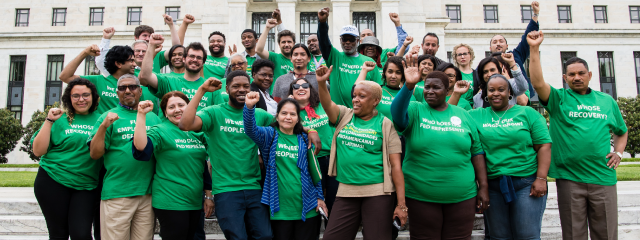Blog
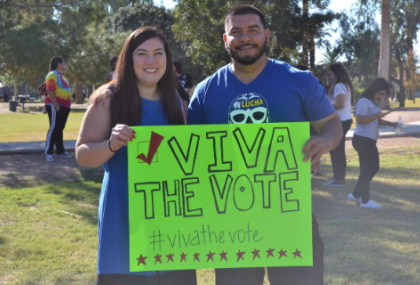
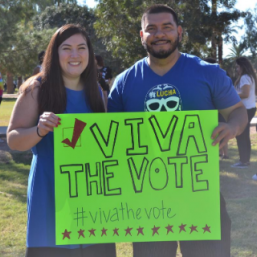
COVID-19 is poised to cause major disruptions to American elections in 2020. We need to be ready for an election, held during a pandemic, where social distancing and quarantine upend the current election administration assumptions and infrastructure. And, we must develop new strategies for voter registration, engagement and voter turnout. Ensuring that the 2020 election runs smoothly and safely in the context of COVID-19 will require adjusting, adapting and rethinking of our election infrastructure in every state.
It is imperative that we protect ballot access, and reduce registration and participation disparities faced by communities of color, new Americans, low-income people, young people and people with disabilities. That’s why, as the primary season winds down in August, CPD/A’s team is gearing up to support our affiliates’ election and voter protection work in seven key states that could make or break this election—Pennsylvania, Georgia, Florida, Michigan, Arizona, Minnesota, and Wisconsin. CPD/A is working with affiliates to ensure that poor and working class Black and Brown communities are centered in both the response to the global pandemic, and in efforts to maximize access and participation in the election later this year.
We believe every state needs to do 3 things to start:
-
Quickly assess their current infrastructure.
-
Get input from impacted communities to inform any changes to their elections to ensure these policies will work for every voter.
-
Prioritize the evidence-based changes to policy and practice that are urgently needed.
Read more about CPD’s fight for an inclusive democracy here.
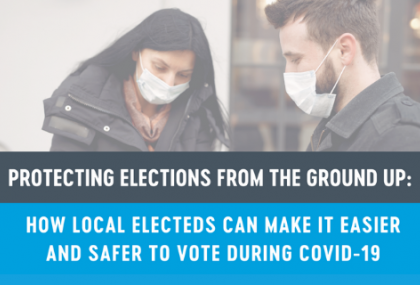
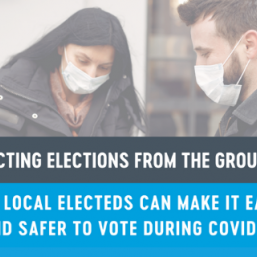
Experts predicted the 2020 general election would shatter voter turnout records. Now, with COVID-19, it’s clear the U.S. electoral system is not prepared to support achieving that goal unless we make it easier and safer to vote. In response to this pressing need, CPD and Local Progress are equipping local elected officials and advocates with the knowledge they need to expand and safeguard voting rights in their jurisdictions.
Our new toolkit, Protecting Elections from the Ground Up: How Local Elected Leaders Can Make it Easier and Safer to Vote During COVID-19, highlights the power that local jurisdictions in expanding voting, especially for underrepresented groups. From expanding voter registration online, offering vote from home options, and incentivizing public employees and students to serve as poll workers on election day, there’s a whole lot our local representatives can do to make it easier and safer for everyone to vote.
While many people think of voting rights and election administration as an issue for federal, state and judicial actors, local officials are closest to the actual administration of elections, and in some cities, counties, and school districts wield significant powers when it comes to election policy decisions. The toolkit highlights proven ways that local elected officials have used their power to successfully make voting more accessible in several cities.
Essential to our vision of building a more dynamic and vibrant democracy, is making sure that all voters can cast their ballots safely. This is why we’ve shared these practical insights with local decision-makers and advocates who hold the power to help get us there. Click here to download and read the toolkit.
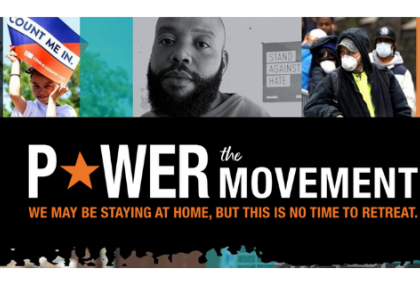
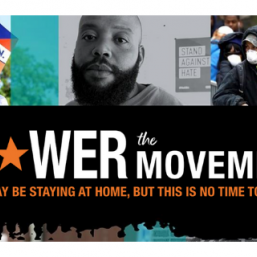
We may be staying at home, but this is no time to retreat. The COVID-19 crisis is devastating many of our communities, and at the same time presenting a once-in-a-lifetime opportunity to fight for, and win, massive structural change.
Democracy isn’t a spectator sport—it’s about friends, families, and coworkers making progress together. Building the movement our communities need takes resources and a network of partners. That is why we have released a new peer-to-peer fundraising campaign to Power the Movement by giving you all the tools you need to build and sustain your own fundraising campaign!
If you believe that another world is possible—and necessary—help bring your family and friends into the movement by launching your own fundraising campaign. Together, we can take this moment and power a movement.
Click here to start your own campaign!
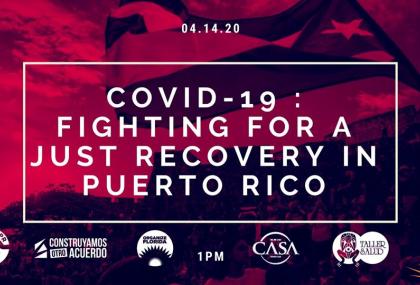
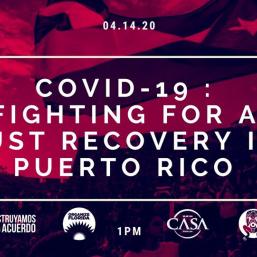
Live stream begins at 1PM, Tuesday April 14th 2020.
Please check back here or the Facebook event page.
https://www.facebook.com/events/671361576758232/
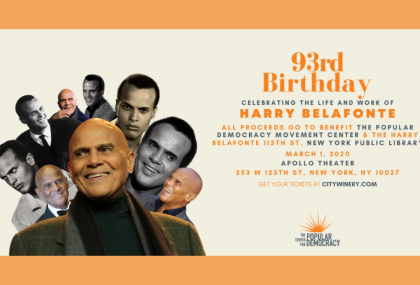
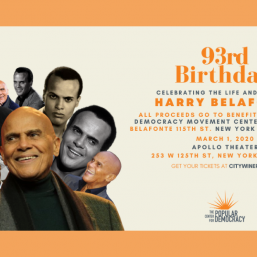
Last year, legendary singer, songwriter, and activist, Mr. Harry Belafonte, joined the Board of Directors of The Popular Democracy Movement Center, CPD’s groundbreaking retreat and strategy center in Ossining, New York. Mr. Belafonte announced that The Popular Democracy Movement Center will be the home for his Arts & Social Justice Initiative. In joining its Board of Directors, The Popular Democracy Movement Center refocused its mission as a place where activists, members from our communities, and artists, can gather to plan, reflect, and recharge for our continued fights. Mr. Belafonte stated, “ The Popular Democracy Movement Center will give leaders, from the artist to the activist community, the forum to discuss, debate, and come to concrete actions that will direct national mobilization efforts.”
In honor of this 93rd birthday, we’re joining Mr. Belafonte on March 1 at the Apollo Theatre in New York City to celebrate his life and legacy, and you’re invited! Proceeds will benefit The Popular Democracy Movement Center and various artists will come together to celebrate and perform including Aloe Blacc, Alice Smith, Talib Kweli, John Forté, Gael Faye, The Resistance Revival Chorus and more! You can purchase general admissions tickets by clicking here.
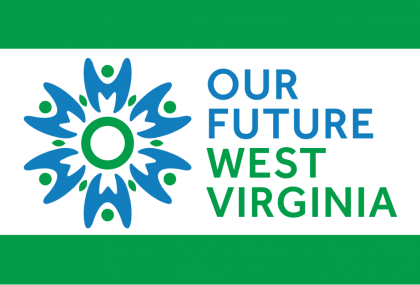
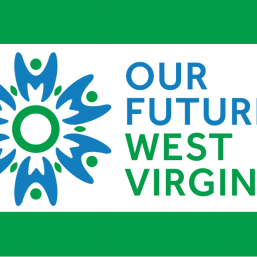
At the start of 2020, CPD affiliate West Virginia Healthy Kids & Families Coalition launched their new name, Our Future West Virginia (OFWV)! OFWV envisions a West Virginia where every child, youth and adult has the justice, dignity and equity needed to thrive. To work towards this vision, we must support West Virginians in tackling a variety of issues on both a local and state-wide level. OFWV is building a grassroots movement to to create and execute plans that address issues of housing, child care, public education, discrimination, voter engagement and 2020 Census participation.
Most recently, OFWV Northern Organizer, Amy Jo Hutschinson testified at a House Oversight Subcommittee hearing on poverty to speak about Trump's detrimental policies on children and families, reiterating her community’s support of Congresswoman Alexandria Ocasio Cortez's Recognizing Poverty Act. At the end of her testimony, Congressman Mark Meadows asked that Hutschinson return to the sub-committee with three recommendations on what they need from this policy. Amy Jo's video has over 1 million views and is viral on Reddit and Twitter.
Community leaders are coming forth in droves to address poverty in West Virginia. OSWV Housing Justice Organizer, Charkera Ervin, developed a nuisance ordinance toolkit in coalition with other state partners including the West Virginia Coalition to end Homelessness, West Virginia Coalition against Domestic Violence, ACLU and West Virginia’s Landlords Association. The toolkit guides and informs community leaders, renters, magistrates and landlords on how to combat these racist and classist ordinances as they permeate themselves into their local communities. Further, OSWV Eastern Organizer, Liira Raines, organized Morgantown's homeless population, folks in recovery, faith community, domestic violence survivors and city council to overturn the Morgantown nuisance ordinance viciously targeting their homeless and people with substance use disorder. Learn more and get involved with OSWV here.
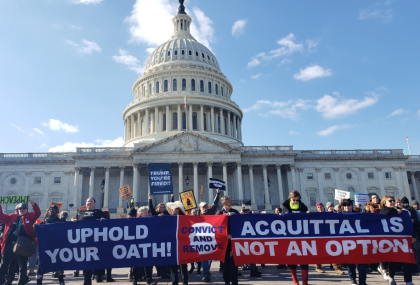
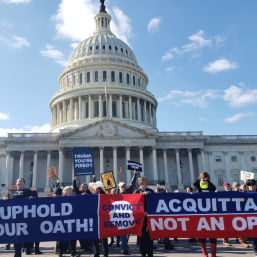
On Wednesday, January 29, our sister organization CPD Action (CPDA) joined the Poor People's Campaign, Remove Trump, By the People, Demand Justice, and other allies in a mass demonstration in the Capitol demanding a fair trial in the impeachment of President Trump. Over 1,500 people participated in the action, shining a bright light on the corruption and cowardice of this administration and its enablers. The action was covered by The Hill, Common Dreams, and Public Citizen.
The day started with a training at the Episcopal Church, where CPDA Network President & Co-Executive Director Jennifer Epps-Addison led an impassioned discussion on the history and need for civil disobedience at these moments of crisis. Protesters then marched to the Capitol and flooded the atrium of the Hart Senate Office building, where they staged a silent protest to bare witness to the injustice of this sham trial. Afterwards, we marched to the steps of the Capitol, where Reverend William Barber spoke on the importance of this moment in history. Finally, a subset of our group took the steps of the Capitol beyond the police line and engaged in civil disobedience. In total, 44 people were arrested.
Just as the Kavanaugh protests galvanized the country and sparked people to take action, the energy coming from this moment is strengthening our movement to bring people to the ballot box to vote with their values this year. While the Senate ultimately dismissed the trial, the witnesses in the impeachment trial demonstrated the corruption of this administration to the rest of the world.
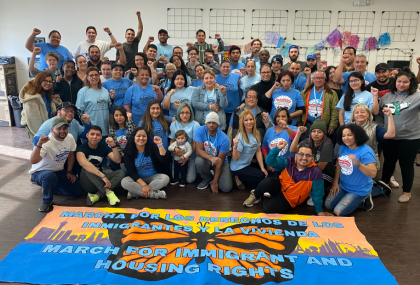
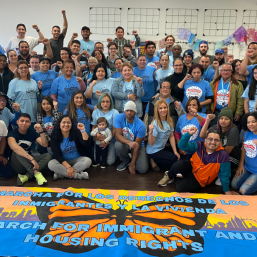
On February 15, Make the Road Action and Make the Road Nevada (MRNV) were joined by Senator and Presidential candidate Bernie Sanders at a rally in Las Vegas to launch their comprehensive housing justice campaign. Surrounded by over 500 Make the Road members and their allies, the campaign pledged to fight for expanded tenant protections and the decriminalization of homelessness.
Over the past year, MRNV has knocked on doors across Las Vegas to learn about the issues that matter to people who live there. As rents continue to rise, affordable housing was identified as a key issue community members worried about most. MRNV quickly moved into action, creating a committee on housing justice to end homelessness and the criminalization of homelessness in Nevada. The committee will advocate for rent control and tenant protections, work to reign in speculators and corporate landlords, and to deeply fund affordable and safe housing.
Since launching its Housing Justice Committee, MRNV and allies organized for and won eviction protections state-wide leading to a decrease in evictions by 7%. Further, when a historic African American community was going to be bulldozed for warehouses, MRNV members stood alongside the community, fought back, and won. When the Las Vegas City Council passed laws to criminalize homelessness, MRNV members and their allies have been out in the streets to demand #HomesNotHandcuffs.
After the rally, hundreds of Nevadans took to the streets to demand a #HometoThrive, #HomesNotHandcuffs, and the #FreedomtoRemain. As Diana Diaz, MRNV’s Housing Justice Leader who has experienced homelessness in Las Vegas said at the rally “We will continue to fight for our freedom to stay in our communities in Las Vegas.” MRNV launched their Housing Justice Campaign to demand tenant protections, rent control, and an end to homelessness in Las Vegas, and across the state of Nevada, and will keep organizing until this vision becomes our reality. If you are interested in getting involved, please reach out to Felipe Silva here.
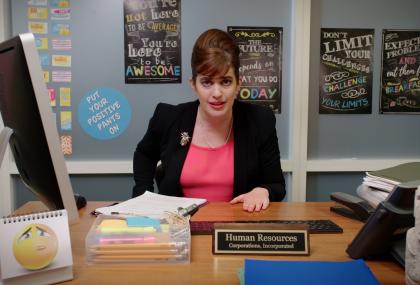
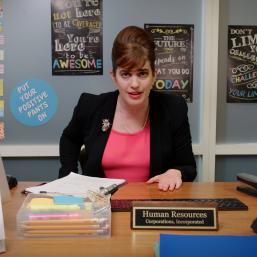
The rapid rise of forced arbitration is a serious threat to hard-won workplace rights including minimum wage, earned sick leave, fair workweek laws, and anti-discrimination protections. Forced arbitration clauses are buried in the fine print of many employment contracts and strip workers of their right to join together in court to fight and expose corporate abuse and illegal practices. In short, forced arbitration is secretive, biased, and expensive. Because corporations set the rules and stack the deck against workers in arbitration, an estimated 98 percent of employment cases are abandoned by workers before they’re ever brought to court.
CPD affiliates and partners are advancing new mechanisms to enforce workplace rights and fight forced arbitration. This month, we released a new video which breaks down how corporations use forced arbitration to avoid justice when they violate workers' rights. Workers forced into arbitration are more likely to be struck by lightning than win against big corporations.
Further, we worked with the UCLA Labor Center and Partnerships for Working Families to release a brief about about successful models to deter corporate wrongdoing illustrating the powerful record of California’s Private Attorneys General Act (PAGA) in addressing corporate lawbreaking and generating significant revenue for enforcement (in 2019 the agency collected over $88 million in PAGA penalties). Critically, PAGA also empowers workers to enforce their rights despite forced arbitration. The brief was covered by the San Francisco Chronicle and you can download and read it on our website.
Click here to learn more about our work on Forced Arbitration.
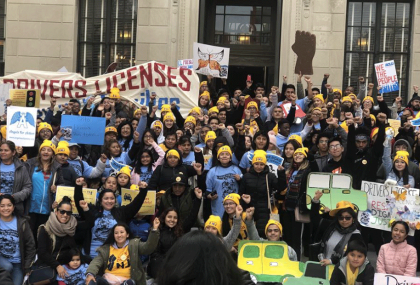
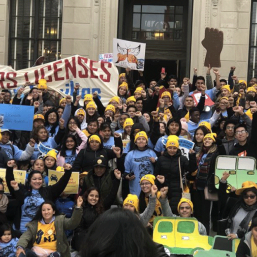
CPD affiliate, Make the Road New Jersey (MRNJ), kicked off 2020 with a number of significant victories for immigrants, workers, and education justice! On December 19, after a five year fight, MRNJ along with coalition partners at Let's Drive NJ, won their campaign to expand access to drivers licenses to all, regardless of immigration status, making New Jersey the 15th state to do so. Governor Phil Murphy signed the bill into law in MRNJ's office in Elizabeth, surrounded by members of MRNJ and other partners in a raucous celebration. Watch Governor Murphy's powerful signing statement here!
Two summers ago, MRNJ members stood shoulder to shoulder with Toys R US workers as a wave of bankruptcies and mass layoffs hit retail workers across the country. Wall Street billionaires' greed and recklessness left thousands of families in economic crisis while CEOs and private equity firms received million-dollar bonuses. MRNJ members joined together with CPD, and laid off and current workers from Toys R US, Sears and Payless, organized by United for Respect, to demand justice and hold Wall Street accountable. In January, Governor Murphy signed the historic Guaranteed Severance Bill (S3170 & A5145) making NJ the first state in the country to mandate that employers provide one week of severance pay for each year of service for their workers when more than 50 employees are laid off.
Additionally, through an innovative partnership with Elizabeth Public Schools (EPS), MRNJ recently launched New Jersey’s first Student Success Center (SSC), a peer-to-peer training and support network which aims to increase college applications by 20% in EPS's lowest-performing school and increase financial aid application district-wide by 15% in its first year. Read more about this initiative here.



